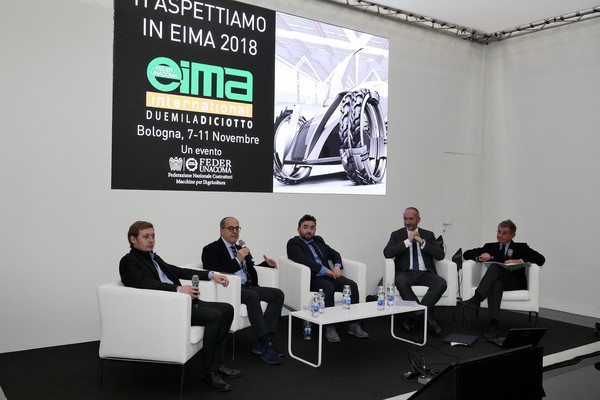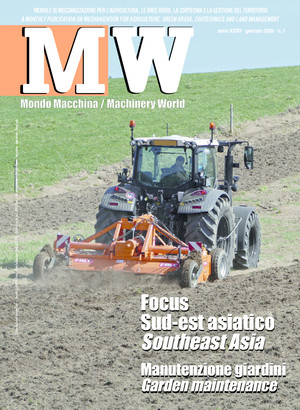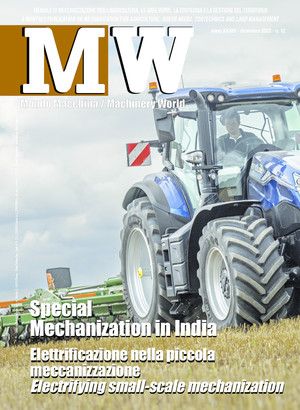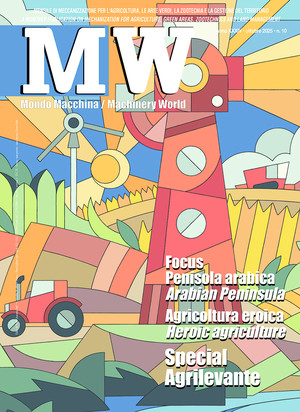
CAP reform, risk of cuts in the RDPs
Several Italian parliamentarians and MEPs visited the exhibition spaces of EIMA International, getting in contact with the technologies for agriculture and the production reality of Italian agro-mechanical companies. At the end of the visit, a conference was held on the theme "A political agenda for agricultural mechanization". The meeting centred on the reform of the CAP, with the risk of national fragmentation and cuts to the RDPs
In Italy, the demand for mechanization is growing, but it is mainly directed towards used, more polluting and less technologically advanced machines compared to new production models. The one highlighted by the president of FederUnacoma, Alessandro Malavolti during the conference entitled “A political agenda for agricultural mechanization”, held 9th of november as part of the initiatives of EIMA International 2018, is a true paradox. In our country, this paradox risks undermining European and Italian policies on safety and the reduction of polluting emissions. At the national level - said Malavolti - a multi-year plan is needed to incentivize the renewal of the machinery fleet (more than 2 million tractors registered in Italy, many of which are over 30 and even 40 years old); on the other hand, at the European level it is necessary to avoid the “nationalization” of the CAP. “The fear - explained the president of FederUnacoma - is that the European umbrella is removed and we move towards a division of the Agricultural Policy between the individual countries in which each decides independently how to manage it, thus causing distortions of prices and therefore of competitiveness”. On the other hand, the CAP still plays a central role both from the point of view of the European budget but, above all, from that of farmers’ income, a quarter of which is supported precisely by the Common Policy. “We cannot afford to lose this support. The first battle - added Paolo De Castro, vice president of the Agriculture Commission of the European Parliament - is the battle on economic resources”. But on this issue, at the European level, there are divergent political directions. While the European Parliament voted to increase the resources to the Union by 0.3%, the European Commission instead proposed a more conservative 0.1%. “Should the proposal of the European Parliament pass - said De Castro - there will be no cuts to the CAP or on the Cohesion policy. If the Commission’s proposal should pass, there will be substantial reductions, and in particular the RDP will be affected by 15% or 20%”. The cuts, that is, would end up hitting the main channels of support for the purchase of agricultural machinery, depriving companies of an important financing instrument. Emilia Romagna, one of the most virtuous regions in terms of RDP management, is also affected. “On the basis of the regulations that have been presented now - said Simona Caselli, Councilor for Agriculture for the Emilia Romagna Region - the cut to the current RDP should be equal to 17.5%. If this is the case, we cannot ‘hold the line’, and even now we would have the capacity to spend twice what we have in the RDP because our production system is very receptive”. At the national level, there is still a lack of efficiency in the use of RDPs. “We need better coordination between the State and the Regions and we must - said Filippo Gallinella, president of the Agriculture Commission of the Chamber of Deputies - simplify the procedures, including the part concerning the provision of funding. There is concern for change, but it is also an opportunity to adjust certain aspects that do not work, for example by focusing on clear and defined objectives”. In the political and institutional world there is, however, an attention to the great questions of agriculture, on which there is a cross-sectional convergence in Europe for the defence of national interests. “These days, on the issue of amendments to the Budget Law, we are thinking about tools to support innovative agriculture - added Gallinella - however the blanket is short. However, we want to be close to Italian agriculture”. “As a young farmer - concluded Guglielmo Golinelli as a member of the Lega and a member of the Agriculture Commission - I cannot be satisfied with the agricultural policy we have seen in Italy. I do not see great possibilities of income, I see depopulation because in less than 30 years we have lost 20% of the UAA”.
A delegation of parliamentarians
A delegation of 17 Italian parlamentarians, members of the Chamber of Deputies, the Senate and the European Parliament, visited on 9th of november the exhibition spaces of EIMA International, the world exhibition of agricultural machinery. During the visit, the parliamentarians saw first-hand the most innovative mechanical technologies for agriculture, a sector that represents one of the excellences “made in Italy” with a turnover of 11 billion euros. From safety to the reduction of polluting emissions, from the simplification of the CAP (Common Agricultural Policy) to the support of agricultural income, the delegation of parliamentarians focused on the great topics of agriculture and mechanization, on which there is a convergence of views, not only at the European level, where the priority is represented by the defence of Italian agriculture and in particular by the protection of our productive excellence, but also of national policy, for which the objective is to stimulate quality production and technology innovations. The delegation was composed of MEPs Paolo De Castro (PD), Nicola Caputo (PD), Nicola Danti (PD), Isabella De Monte (PD), Damiano Zoffoli (PD), and Marco Zullo (M5S). The Italian Parliament was represented by Filippo Gallinella (M5S); Gianpaolo Vallardi (Lega), Luciano Cadeddu (M5S), Maria Chiara Gadda (PD), Chiara Gagnarli (M5S), Guglielmo Golinelli (Lega), Antonella Incerti (PD); Marzio Liuni (Lega), Pasquale Maglione (M5S), Raffaele Nevi (Forza Italia); Debora Degl’Innocenti (Political Advisor of the Hon. Mario Lolini, Lega).








